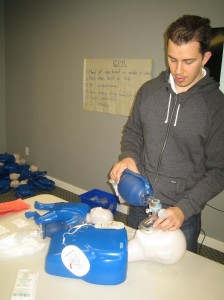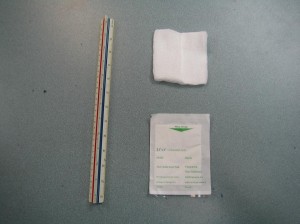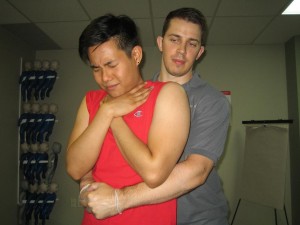
Do you need first aid and / or CPR certification for the workplace? Do you need to enrol in a course based on academic requirements? Register for a course with Victoria First Aid and get the lowest prices, most experienced teachers and the best training. Classes are never cancelled and teachers use a variety of teaching methods to make the process as fun, educational and enjoyable as possible. The training facility is centrally located and groups of people / businesses can request private courses at the facility or a trained and certified instructor can come to you. Popular courses available including standard first aid, occupational first aid level 1, basic life support, advanced life support, food safe level 1, CPR level “C”, emergency first aid, babysitting training and advanced first aid. Course length varies from 4 hours to 2 weeks. To register for any course, including a one day emergency first aid course use the contact information posted below.
Registration with Victoria First Aid

Enrolment for emergency first aid programs through Victoria First Aid is very simple and hassle-free. Click here to visit the Victoria First Aid website for a complete list of available classes, schedules, rates, and the registration form. More registration details include:
- Website (On-Line Registration): http://firstaidcprvictoria.ca
- Email: info@firstaidservices.ca
- Telephone: 1-888-870-7002
Competitive Course Rates

Victoria First Aid offers the cheapest course rates in the area. Rates include taxes, certification fees, and training manuals and equipment. Trainees rest assured they will not have additional expenses during the training. Full refunds are given to trainees who drop out, provided a 72-hour notice was given.
High-end Training Centers
Victoria First Aid offers trainees well-maintained and comfortable training centers. All classrooms utilize the most up-to-date training equipment for the best learning experience possible. All centers are within walking distance to public transportation and free parking as well.
Best Instructors with Emergency First Aid Courses in Victoria
Course instructors with Victoria First Aid are known for being very welcoming and friendly. They are all registered professionals with St Mark James Training so don’t hesitate to ask them any questions.
What Is Included in an Emergency First Aid Course?
Participants that register for emergency first aid training will learn about these topics:
- 2012 ILCOR consensus approved cardiopulmonary resuscitation
- Choking rescues for both fully and partially obstructed airways
- Effective use of automated external defibrillators
- When and how to contact emergency medical services (911)
- Being prepared and staying safe during emergencies (includes the use of personal protective equipment PPE)
- Recognizing and managing breathing emergencies including asthma, shock and allergic reactions
- Recognizing and managing circulatory emergencies including heart attacks and stroke
- Learn how to effectively provide aid with medications (5 rights of medication)
Learn about these topics and more by enrolling in a course today.
Did You Know?
Managing hypothermia
Hypothermia is caused by a sudden or gradual drop in core body temperature. This is usually due to extremely cold temperatures or loss of the body’s temperature regulating abilities. If not managed adequately and immediately, it can cause shock and multi-organ failure. First aid rescuers should remember these quick management tips for hypothermia:
- Move the victim out of the cold, preferably indoors where it is warm.
- Change the person’s clothing, as ice that is frozen on clothes will soon melt.
- Warm the victim’s torso first. Warming the extremities first can cause cold blood to rapidly circulate to the major organs in the torso and cause shock.
- Cover victim with a blanket or additional clothing.
- DO NOT immerse victim in warm water. This can cause heart palpitations.